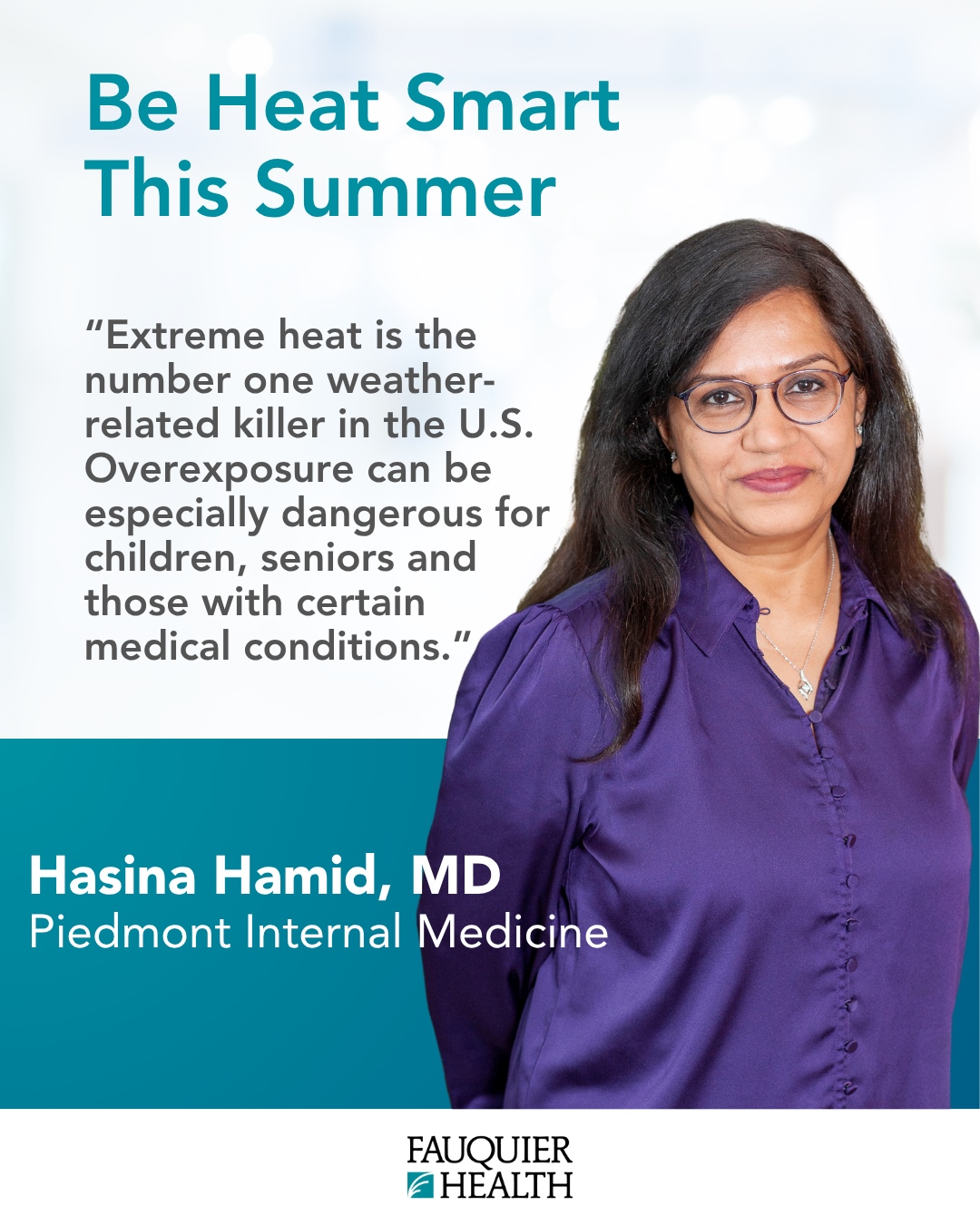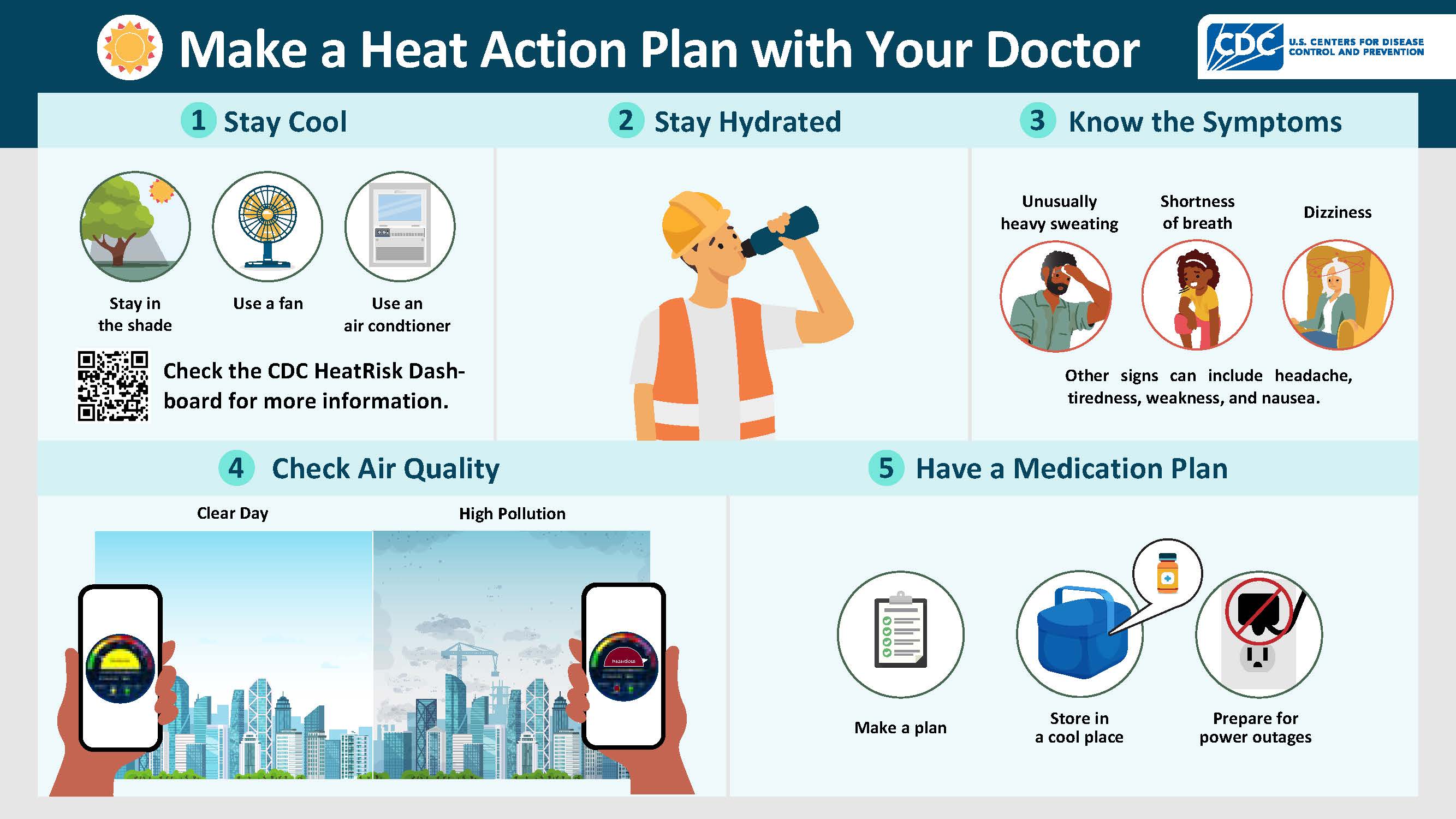News
Be Heat Smart this Summer
June 24, 2025
by Hasina Hamid, MD, Piedmont Internal Medicine
Summer has started in full force, with the start of the season bringing a potentially record-setting heatwave. Our area is listed as having major and extreme heat risk through next week, according to the National Weather Service. Stay inside if you can, but if you are outside, try to stay in the shade, take frequent breaks and be aware of the symptoms that can lead to a health emergency.
Have a plan to keep hydrated and to keep medications cool, even in the event of a power outage. If you are at higher risk of heat-related problems, pay close attention to your body. If you experience heat-related symptoms, seek medical attention. Check on your family and friends to make sure they are staying cool and hydrated.

Graphic courtesy of CDC
Heat Safety
Extreme heat is the number one weather-related killer in the U.S. Overexposure can be especially dangerous for children, seniors, those with pre-existing illnesses and patients on certain types of prescriptions and over-the-counter medicines. There are three major types of heat-related health conditions you should be familiar with:
- Heat cramps typically occur in the stomach, arms and legs, and are the result of losing too much water and salt. They’re often the first sign of a heat-related illness and can lead to more serious conditions like heat exhaustion and heat stroke.
- Heat exhaustion occurs when your body loses too much water and salt, and can’t cool itself. It typically presents as a combination of many symptoms, including
- Headache
- Nausea
- Dizziness
- Weakness
- Irritability
- Thirst
- Heavy sweating
- Elevated body temperatures
- Decreased urine output and
- Skin that appears cool, moist, pale, ashen or flushed.
If left untreated, heat exhaustion can lead to heat stroke.
- Heat stroke is a medical emergency that occurs when the body has lost excessive amounts of water and salt and is completely overwhelmed by heat. Characterized by
- Dizziness
- Fainting
- Loss of consciousness
- Slurred speech
- Confusion
- Agitation
- Hallucinations or an altered mental state
A heat stroke requires immediate medical attention, as it can lead to organ failure and death. Placing ice packs in the patient’s armpits and groin area can help with cooling while being transported to medical care.
Here are a few simple ways you can beat the heat this summer and help prevent heat-related illnesses:
- Be aware of temperature and humidity levels in your area and avoid going outdoors for activities or exercise in extreme heat.
- Stay hydrated by drinking plenty of water, regardless of how active you are (and remember to keep your pets hydrated too!). Sports drinks can also be helpful to replace salts and provide some sugar.
- Always use an SPF-15 or higher sunscreen that protects against both UV-A and UV-B rays, applying 30 minutes prior to exposure and reapplying accordingly.
- NEVER leave infants, children or animals in cars unattended, even if the windows are cracked open.
- Take frequent breaks when enjoying the outdoors, especially if you are not accustomed to working or exercising in a hot environment.
- Break out your favorite lightweight, light-colored and loose-fitting clothing.
- Take advantage of cooler areas (even when outside), and when the temperature rises above 90 degrees, consider switching to an indoor activity.
- Limit or avoid alcoholic beverages, as they can impair your body’s ability to self-regulate its temperature and compromise your hydration status.
- Stay mindful of the signs and symptoms of heat-related illnesses and know how to respond.
For more detailed information about heat-related illnesses, their symptoms and how to respond, visit https://www.cdc.gov/disasters/extremeheat/index.html.
Following these helpful tips, taking the proper precautions and using your common sense can go a long way towards helping you stay safe and healthy all summer long. If you or someone you’re with shows signs of a heat-related illness, it’s important to seek proper medical attention immediately and – in cases of emergency – call 9-1-1.
When emergencies strike, minutes matter. Fauquier Health can provide quality emergency care when you need it most.